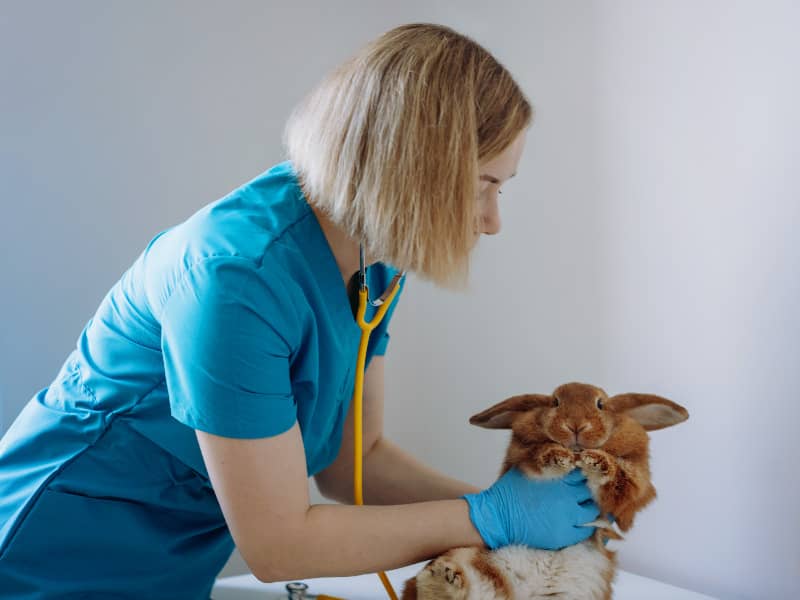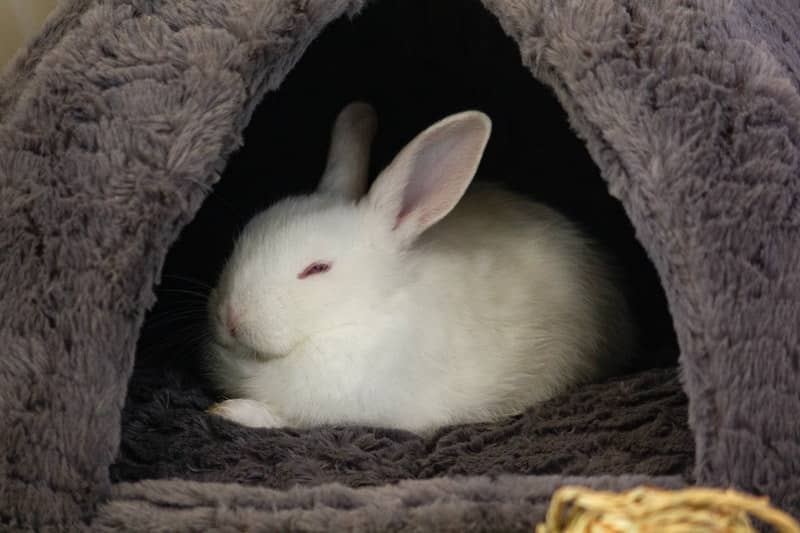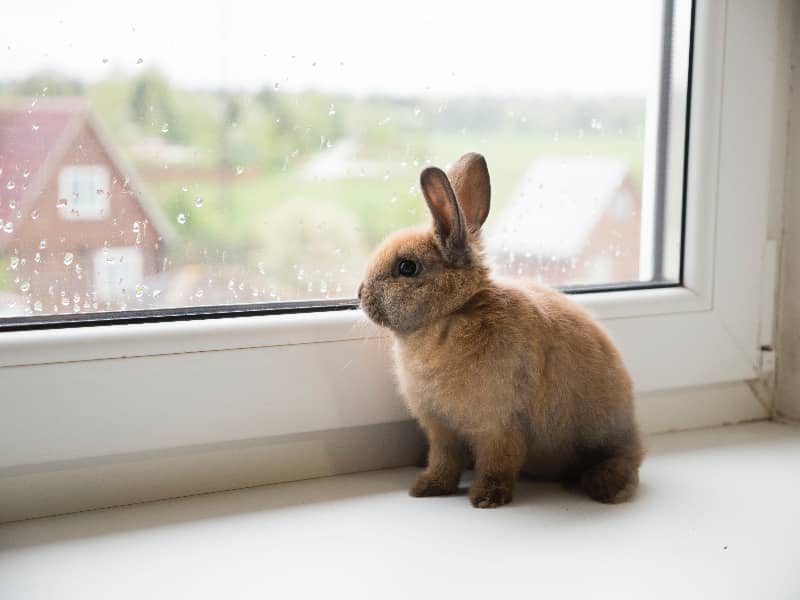
Can rabbits have allergies?
Rabbits are not only cute, fluffy animals, but also complex creatures with their own needs and health challenges. One of the questions rabbit owners often ask is whether rabbits can have allergies? In this article, we'll get to the bottom of this question and highlight all the aspects you should know as a responsible rabbit owner.
- Can rabbits have allergies?
- What is a rabbit allergy?
- General information about rabbits
- What is an animal allergy?
- Can rabbits get an allergy?
- Common allergens in rabbits
- Symptoms of allergy in rabbits
- Diagnosis of allergy in rabbits
- Treatment options for rabbit allergy
- Preventive measures against rabbit allergy
- Myths and misunderstandings
- Cost factor
- Conclusion: Rabbit Allergy
What is a rabbit allergy?
An allergy is an excessive reaction of the immune system to a substance that is normally harmless. These substances are called allergens and can range from pollen to food to animal dander. Allergies are common in humans, but what about rabbits?
Why is the topic important?
This topic is especially important because an undetected or poorly treated allergy can significantly affect the well-being of your rabbit. Symptoms such as itching, breathing problems or digestive disorders can be stressful not only for the animal but also for the owner. Therefore, it is important to be well informed and to take the right measures at an early stage.
Overview
In this article, we will look at various aspects surrounding the topic of "Can Rabbits Get Allergies?". We will look at rabbit anatomy and physiology, identify common allergy triggers and symptoms, discuss diagnosis and treatment options, and much more. The goal is to give you a comprehensive overview so you can best care for your rabbit's health.
General information about rabbits
Before we address the question of whether rabbits can get allergies, it is useful to develop a basic understanding of these animals. Rabbits are more than just cute pets; they are complex creatures with special needs and requirements.
Anatomy and physiology
Rabbits have a unique anatomy and physiology that sets them apart from other pets. For example, their digestive system is very sensitive and requires a special diet rich in fiber. Their respiratory system is also structured differently than that of dogs or cats, which must be taken into account when diagnosing and treating respiratory diseases.
Common health problems
Rabbits are prone to a number of health problems, including digestive disorders, dental problems, and respiratory problems. Some of these problems can be exacerbated by allergies or even trigger allergic reactions themselves. Therefore, it is important to recognize the signs early and take appropriate action.
Importance of nutrition
Diet plays a crucial role in the health of a rabbit. An unbalanced diet can not only cause digestive problems, but also weaken the immune system, making the animal more susceptible to allergies. It is therefore important to ensure a balanced diet with sufficient fiber, vitamins and minerals.
What is an animal allergy?
Now that we have a basic understanding of rabbits and their needs, we can turn to the topic of animal allergies. Allergies are not just a human problem; animals can suffer from them too. But what exactly is an animal allergy, and how does it differ from human allergies?
Definition and causes
An animal allergy is basically an excessive immune reaction to a substance that is normally harmless. This reaction can be triggered by a variety of factors, including genetic predisposition, environmental conditions, and diet. Unlike humans, who can communicate verbally, animals usually show their discomfort through behavioral changes or physical symptoms.
Symptoms
The symptoms of allergy in animals can be varied and range from skin irritation and itching to breathing problems and digestive disorders. It is important to recognize these signs early, as an untreated allergy can lead to serious health problems. Some of the most common symptoms include excessive scratching, sneezing, coughing, diarrhea and vomiting.
Diagnostic methods
Diagnosing an animal allergy can be challenging because the symptoms are often non-specific and can also be caused by other conditions. Usually, the veterinarian will take a thorough history and order various tests, such as blood tests or skin tests.
Sometimes an elimination procedure may also be necessary, in which potential allergens are removed from the pet's environment or diet to identify the cause of the allergy.
Can rabbits get an allergy?
Now we come to the core topic of this blog post: Can rabbits really get an allergy? This question may sound simple, but the answer is complex and requires a thorough investigation.
General opinions
The general opinion is that rabbits, like many other animals, can be susceptible to allergies. However, scientific research in this area has not yet progressed as far as with allergies in humans or other pets such as dogs and cats. Nevertheless, there are numerous reports from rabbit owners who have observed allergic reactions in their animals.
Scientific studies
Scientific studies on the topic of allergies in rabbits are scarce, but there is some research that suggests that rabbits may indeed exhibit allergic reactions. These studies tend to have smaller sample sizes and are often not widely accepted, but they offer valuable insight into the mechanisms of allergy in these animals.
Expert opinions
Veterinarians and other animal health experts widely agree that rabbits can suffer from allergies, although the symptoms are often more subtle than in other animals. Diagnosis and treatment can be complicated, however, as the specific allergens and best treatments have not yet been fully researched.
So that's the current state of affairs: yes, rabbits can get an allergy, but scientific research is still ongoing, and there's a lot we don't know yet.
Common allergens in rabbits
Now that we've established that rabbits can indeed get allergies, it's important to know the most common allergy triggers. This information can help you minimize potential risk factors and ensure a better quality of life for your rabbit.
Food as a trigger of rabbit allergy
One of the most common allergy triggers in rabbits is food. Some rabbits may be allergic to certain types of vegetables, fruits, or even commercial rabbit food. It is important to carefully monitor your rabbit's diet and consult a veterinarian immediately if there are signs of allergy.
Environment
The environment in which your rabbit lives can also trigger allergies. This includes factors such as dust, pollen, mold, and even cleaning products. Some rabbits are more sensitive to these environmental factors than others. Therefore, it is important to regularly check your rabbit's living conditions and adjust them if necessary.
Medication
Yes, medications can also cause allergies in rabbits. Although medications are usually used to treat illness or relieve symptoms, they can cause unwanted side effects in some animals, including allergic reactions. If your rabbit is on medication, be extra vigilant and watch for signs of allergy.
Knowing about these common allergy triggers can help you minimize the risks to your rabbit and provide better care. I hope this information is useful to you.
Symptoms of allergy in rabbits
If you suspect your rabbit may have an allergy, it is critical to know the symptoms. Recognizing signs early can make all the difference when it comes to giving your pet the best care possible.
Skin problems
Skin problems are one of the most noticeable symptoms of allergy in rabbits. These include redness, scaling, excessive scratching and even hair loss. If you notice such signs, it is advisable to consult a veterinarian to determine the exact cause and initiate appropriate treatment.
Respiratory problems
Respiratory problems can also be an indicator of allergy. Symptoms such as coughing, sneezing or difficulty breathing should not be ignored. In severe cases, an allergic reaction can even lead to asthma-like conditions that require urgent veterinary treatment.
Digestive problems due to rabbit allergy
Although less common, digestive problems such as diarrhea or vomiting can also be signs of allergy. These symptoms are of particular concern because they can lead to dehydration and other serious health problems. If your rabbit shows digestive problems, it is important to consult a veterinarian as soon as possible.
Recognizing these symptoms is the first step in getting your rabbit the help it needs. If you notice one or more of these signs, it is important to seek professional veterinary help.

Diagnosis of allergy in rabbits
Diagnosing allergy in a rabbit can be a complex matter. Because symptoms are often non-specific and can be caused by a variety of factors, a thorough examination by a qualified veterinarian is essential.
Veterinary examination
The first step in diagnosing an allergy is always a thorough veterinary examination. The veterinarian will take a history, physically examine the animal, and order further testing if necessary. This may include blood tests, skin tests, or even x-rays, depending on the symptoms observed.
Allergy tests
In some cases, the veterinarian may perform specific allergy tests to identify the exact cause of the allergic reaction. These tests can be skin tests or blood tests and are designed to identify specific allergens. However, it is important to note that these tests are not always reliable and can sometimes give false-positive or false-negative results.
Exclusion procedure
Another approach to diagnosing allergy is the exclusion procedure. This involves systematically removing potential allergens from the rabbit's environment or diet to see if symptoms subside. This can be a lengthy process, but is often necessary to determine the exact cause of the allergy.
Diagnosing an allergy in a rabbit can be challenging, but it is the key to effective treatment and improving your pet's quality of life.
Treatment options for rabbit allergy
Once an allergy has been diagnosed in your rabbit, the next step is to find an appropriate treatment. Treatment can vary depending on the severity of symptoms and the allergens identified. Here are some of the most common treatment options.
Medication
In some cases, medications such as antihistamines or corticosteroids may be prescribed to relieve the symptoms of allergy. However, it is important to follow the veterinarian's instructions carefully and only use the medication for as long as necessary, as some of these medications can have side effects.
Changes in the diet
If the allergy is triggered by certain foods, a change in diet is often the most effective treatment. In such cases, the veterinarian will likely recommend a special diet that is free of the identified allergens. This may mean switching to hypoallergenic food or eliminating certain vegetables or fruits from the rabbit's diet.
Environmental adaptations
Sometimes allergies can be triggered by environmental factors such as dust, pollen or cleaning agents. In such cases, an adjustment of the rabbit's living conditions may be necessary. This may mean cleaning the cage more regularly or avoiding certain cleaning agents.
Treating an allergy in a rabbit can be complex and often requires a combination of approaches. It is important to work closely with your veterinarian to find the best treatment strategy for your pet.
Preventive measures against rabbit allergy
Prevention is often the best way to avoid health problems, and this is also true for allergies in rabbits. By taking preventive measures, you can minimize the risk of an allergic reaction in your rabbit and ensure a better quality of life.
Low allergen diet
One of the most effective preventative measures is to switch to a low-allergen diet. This means removing potential allergens from your rabbit's diet or replacing them with hypoallergenic alternatives. However, such a diet should always be implemented in consultation with a veterinarian to ensure that all of the animal's nutritional needs are met.
Clean environment
A clean environment is critical to the health of any pet and can be especially important in preventing allergies. This means cleaning the cage regularly, minimizing dust and dirt, and avoiding potentially allergenic substances such as certain cleaning agents or fragrances.
Regular visits to the vet
Regular veterinary visits are another important step in preventing allergies. A veterinarian can detect signs of allergy early and recommend appropriate testing and treatment. In addition, the veterinarian can provide valuable allergy prevention tips that are specific to your rabbit's needs.
Preventive measures can make a big difference in the health and well-being of your rabbit. By taking proactive steps, you can minimize many of the risks associated with allergies.
Myths and misunderstandings
There are many myths and misconceptions in the world of animal health, and the topic of allergies in rabbits is no exception. It's important to clear up these misconceptions to make sure you're giving your rabbit the best care possible.
Common mistakes
A common misconception is that rabbits cannot get allergies. As we have already discussed, this is not the case. Another myth is that only certain breeds of rabbits are prone to allergies, which is also not true. Allergies can occur in rabbits of any breed and any age.
What to avoid
There is also a lot of well-intentioned advice that can prove counterproductive. For example, the use of certain "natural" remedies could actually be harmful if not used properly or if they interact with other medications. It is always best to seek the advice of a qualified veterinarian before starting any new treatment.
Expert opinions on rabbit allergies
Experts in the field of animal health can help clear up myths and misconceptions. Their scientifically based views and experience are a reliable source of information and should always be considered when it comes to your rabbit's health.
Clearing up myths and misconceptions is an important step in making sure you are well informed and can make the best possible decision for your rabbit's health.
Cost factor
Treating an allergy in a rabbit can be stressful not only emotionally, but also financially. In this section, we take a look at the various costs that can be involved in diagnosing and treating an allergy in rabbits.
Treatment costs of rabbit allergy
The cost of treating an allergy can vary depending on the severity of the condition and the recommended treatments. Medications, special food and vet visits can add up quickly. It is therefore important to have a financial plan and possibly a reserve for unexpected expenses.
Insurance options
Pet health insurance can be a wise investment to minimize financial burden. Different insurance plans offer different coverage options, including costs for diagnosis, treatment and even preventive measures. It pays to compare different quotes and read the fine print carefully.
Homemade solutions
In some cases, homemade solutions can also be a cost-effective alternative to expensive treatments. This could include making hypoallergenic food at home or using natural cleaning products. However, it is important to always discuss such approaches with a veterinarian to ensure they are safe and effective.
The financial side of allergy care is an important aspect that is often overlooked. By careful planning and utilizing available resources, you can ensure that your rabbit receives the best care possible without breaking your budget.
Conclusion: Rabbit Allergy
After working through the various aspects of the topic "Can Rabbits Get Allergies?" it is time for a summary and some concluding thoughts.
Important findings
We have learned that rabbits can indeed suffer from allergies, although scientific research in this area has not yet advanced as it has for other animals. The symptoms can be varied and range from skin irritation to breathing problems and digestive disorders.
Practical tips
Early detection and treatment of allergies is critical to your rabbit's well-being. This includes regular vet visits, careful monitoring of possible symptoms, and adjusting diet and environment to minimize potential allergens.
Further resources
For more information and support, it is always advisable to seek professional veterinary help. There are also many online resources, forums and social media groups where you can find more tips and experiences from other rabbit owners.
The topic of allergies in rabbits is complex, but with the right knowledge and resources, you can ensure that your rabbit lives a healthy and happy life. I hope this blog post has given you a comprehensive overview of the topic and will be helpful in caring for your furry friend.
Author

-
Garden animal - A life with nature
Welcome to my animal blog! My name is Dirk and I am happy to take you on my journey through the fascinating world of animals and gardening.
Born 54 years ago, I have had an insatiable curiosity for the animal world around me since childhood. Although I have moved professionally in other industries, my true passion has always been animals and nature. It is remarkable how a small garden has become such an important part of my life.
Many of my fondest memories are associated with the animals that share our home. Whether it's the curious squirrels that scurry across the trees in the morning, the colorful variety of birds that visit our feeders, or the busy bees and butterflies that pollinate our flowers, every moment with them is invaluable to me.
This blog is my contribution to share my experiences, discoveries and insights with like-minded people. Here I will share stories of unforgettable encounters with animals, give tips on gardening and creating wildlife-friendly habitats, and take you on my journeys through nature.
Thank you so much for being here!
Cordial,
Dirk aka garden animal
Last posts
- 27. February 2024PetsVeganes Hundefutter – Grün und Gesund?
- 18. January 2024ChickensOregano für Hühner
- November 27, 2023HamsterDiurnal hamsters
- November 24, 2023HamsterHamster hammock






